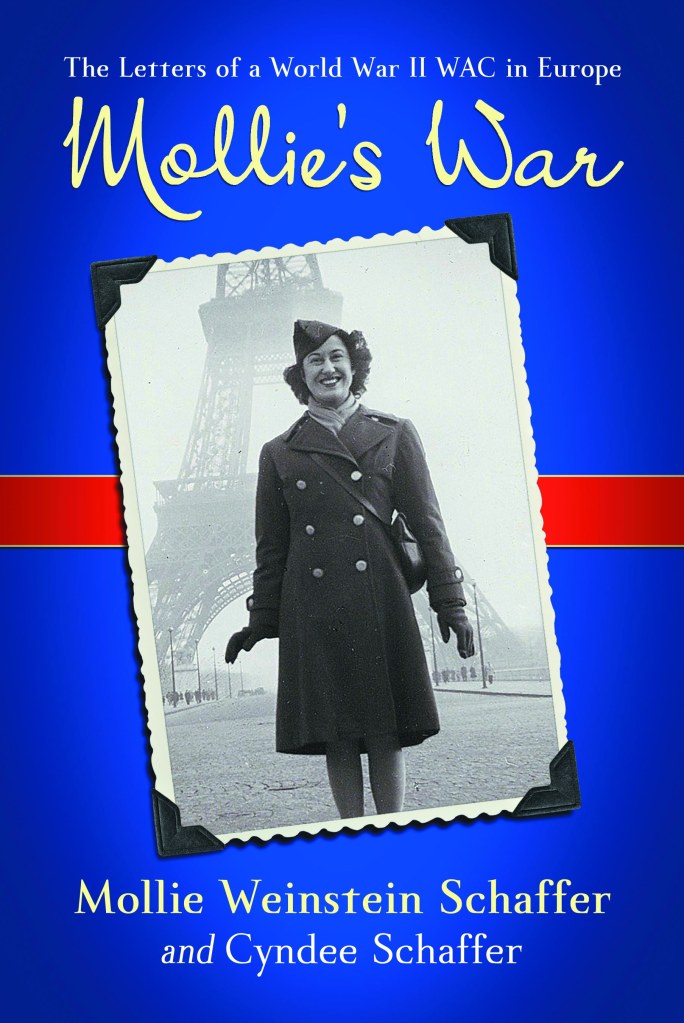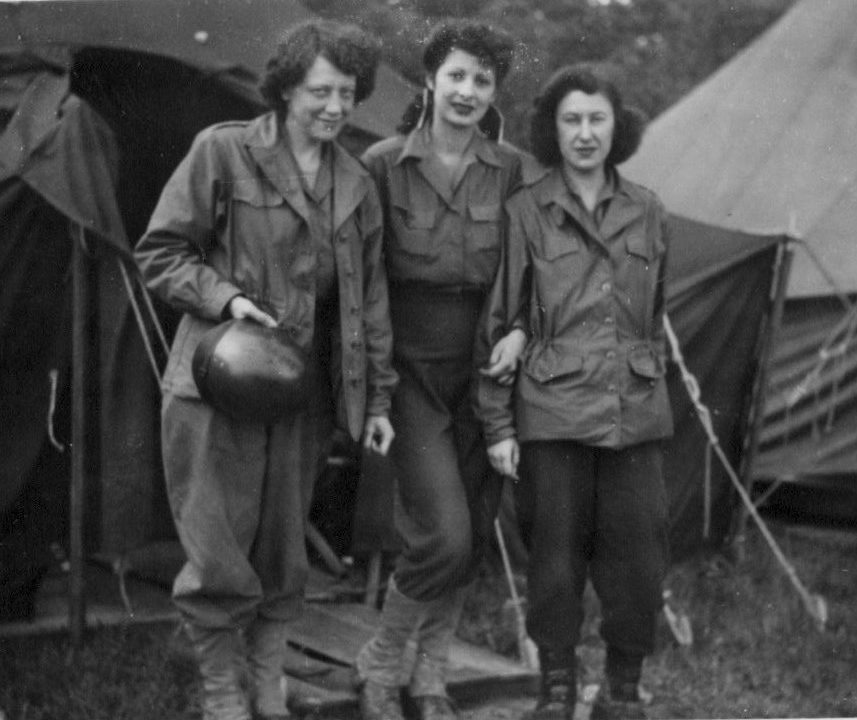 Even though Cyndee Schaffer always knew her mother served during World War II, it was still a little hard to believe. “She was always a very quiet person,” says Schaffer, “and that she found the courage to join the military just amazed me.” In fact, Schaffer’s mother – Mollie Weinstein Schaffer – served as an enlistee in the newly-formed Women’s Army Corps from 1943 to 1945 during which time she sent home hundreds of letters describing bombings in England, landing in Normandy just weeks after the Allied invasion, and serving in Germany after VE Day. Her fascinating letters have been collected in the recent book Mollie’s War, and this Sunday, July 17th at 3 pm you can join Cyndee Schaffer when she visits EPL’s 1st Floor Community Meeting Room to read excerpts from the book and share Mollie’s WWII memorabilia. In anticipation of her visit, we recently spoke with Cyndee via email about her work editing and researching Mollie’s War, her favorite of her mother’s WAC experiences, the lost art of letter writing, and what she hopes readers take away from the book.
Even though Cyndee Schaffer always knew her mother served during World War II, it was still a little hard to believe. “She was always a very quiet person,” says Schaffer, “and that she found the courage to join the military just amazed me.” In fact, Schaffer’s mother – Mollie Weinstein Schaffer – served as an enlistee in the newly-formed Women’s Army Corps from 1943 to 1945 during which time she sent home hundreds of letters describing bombings in England, landing in Normandy just weeks after the Allied invasion, and serving in Germany after VE Day. Her fascinating letters have been collected in the recent book Mollie’s War, and this Sunday, July 17th at 3 pm you can join Cyndee Schaffer when she visits EPL’s 1st Floor Community Meeting Room to read excerpts from the book and share Mollie’s WWII memorabilia. In anticipation of her visit, we recently spoke with Cyndee via email about her work editing and researching Mollie’s War, her favorite of her mother’s WAC experiences, the lost art of letter writing, and what she hopes readers take away from the book.
Evanston Public Library: How did you discover your mother’s letters? What was it like reading them for the first time?
Cyndee Schaffer: I always knew that my mother wrote letters home when she was stationed in Europe during WWII and that her sister saved them. When we were in school and discussing WWII, my mother would always give us a copy of a letter or a newspaper clipping pertinent to the topic of discussion, but I don’t think we paid much attention to the significance of the fact that our mother served in the military.
It wasn’t until 1999 when my job contract was ending that my brother-in-law and I started reading the letters and putting them in chronological order. As we read them, it was amazing to realize that my mother left her quiet life in Detroit to fight a war across the ocean. But then I got another job contract, and so it wasn’t until several years later that I began earnestly working on the book.
EPL: Can you tell us about the process of putting Mollie’s War together? Did you do any additional research on the WAC and World War II?
CS: At various times throughout the years, I would mention my mother’s memorabilia to family and friends, and they would show interest about turning it into a book. But somehow life always got in the way, and we never did anything. Every time that I would see something in the newspaper about groups that were gathering the stories of veterans, I would mention it to my mother, but she always said that she wanted her own book.
In October 2007, my mother learned in a letter that her last surviving WAC buddy had passed away. This gave me the impetus to begin this project and see it through to the end while my mother was still alive. She was 91 at the time. My current job contract was ending in December 2007, and I decided not to seek another contract. Somehow the stars aligned, and the timing was perfect.
I had to read all of the letters and transcribe them with the help of my family—over 1000 typed pages in total. As I was transcribing the letters, I began going to the Pritzker Military Library in downtown Chicago once or twice a week. Because of censorship, my mother was not able to disclose any detailed information. I worked with the staff at the library to get a better understanding of the WAC’s role during WWII in Europe. I read many books and searched many websites. The head librarian was also instrumental in helping me find a traditional publisher.

EPL: Did anything about the letters surprise or disappoint you? Did you learn anything new about your mother? Is there a certain story or event from her experiences that particularly stood out for you?
CS: Absolutely nothing disappointed me in the letters. They were all so well written—whether my mother’s letters, my aunt’s letters or letters from other soldiers. Most letters were handwritten in ink with few if any cross-outs. Penmanship was easy to read and use of language flowed.
I think I was most surprised that my mother decided to enter the WAC and serve her country. She was always a very quiet person and that she found the courage to join the military just amazed me.
I share lots of stories in Mollie’s War and in my presentation: how my mother was stationed in London during the doodlebug or buzz bomb attacks and managed through the constant air raids and bombings; how she landed in Normandy two months after D-Day and adjusted to the rugged life of living in a tent and “taking a bath in your helmet;” how she easily navigated around Paris thanks to her knowledge and skill in the use of the French language; and how she witnessed the devastation of Germany while stationed in Frankfurt with the Army of Occupation.
EPL: With the prevalence of Facebook, texting, Twitter, and Skype, letter writing is becoming an increasingly vanishing art. Do you feel a sense of loss now that so few people write actual letters? Will that change how we write history?
CS: It is sad to think that letter writing is becoming a lost art. Other than with my older relatives and as thank you notes for gifts, I seldom receive or write letters anymore. Emailing and keeping in touch via Facebook, texting and other social media seems to be convenient.
I don’t know if it will change how we write history. With instant access and everyone using their cell phone cameras, so much more can be accurately and immediately recorded and shared.
EPL: What have you done to preserve the actual letters, and will you be sharing any of them when you visit EPL on July 17? What other memorabilia do you plan to bring along?
CS: I’ve placed all of the letters in archival sleeves and then into a notebook. At some point I will donate them to the Pritzker Military Library along with my mother’s uniform and my dad’s uniform. I always bring copies of the letters, newspaper clippings and other memorabilia. I also bring my mother’s medals in a shadow box. In my presentation, I will be reading excerpts from some of her letters.

EPL: What would you like readers to take away from Mollie’s War?
CS: I would like readers to learn about the contributions women made as soldiers during WWII and to understand their often-overlooked perspectives on the war effort. These were the first women other than nurses to serve overseas during WWII. They paved the way for future generations of women to serve in the military and to “be all you can be.”
I also hope that readers will realize the importance of taking the time to learn about history and how their parents related to the world around them during their youth and young adulthood. It is so important to ask your parents (and other relatives) questions and listen to their answers.
Interview by Russell J.
